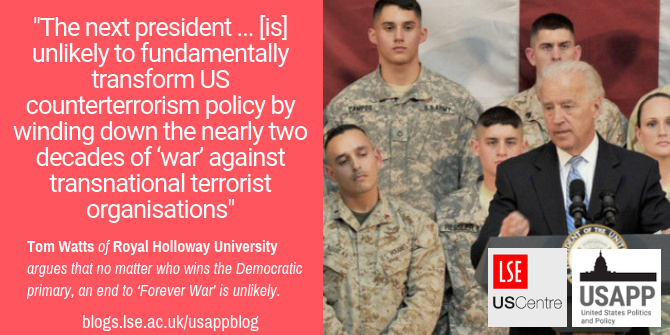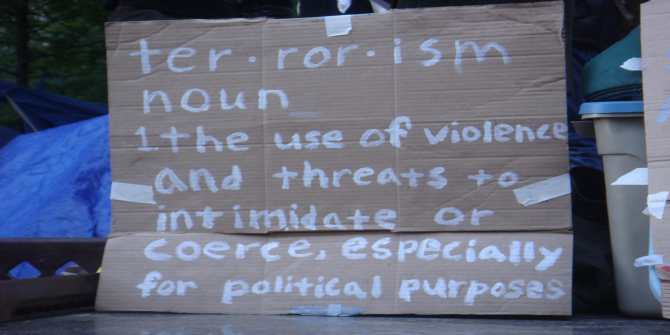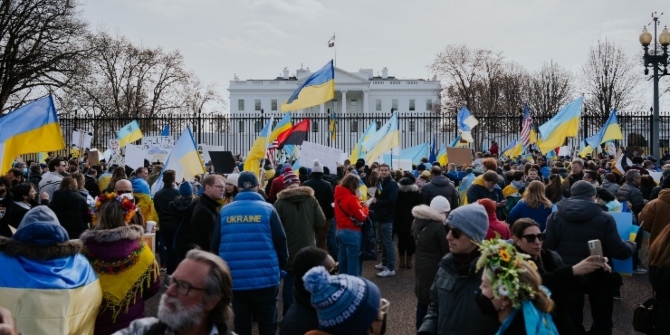 Since 2001, the US has been engaged in a global campaign of counterterrorism operations in Iraq, Afghanistan and elsewhere. Tom Watts writes that if a Democrat is elected to the White House in 2020, the ‘Forever/Endless War’ is unlikely to end. As presidential candidates, both Barack Obama and Donald Trump pledged to change how transnational terrorist organisations were fought, but neither ended the global spread of US counterterrorism operations.
Since 2001, the US has been engaged in a global campaign of counterterrorism operations in Iraq, Afghanistan and elsewhere. Tom Watts writes that if a Democrat is elected to the White House in 2020, the ‘Forever/Endless War’ is unlikely to end. As presidential candidates, both Barack Obama and Donald Trump pledged to change how transnational terrorist organisations were fought, but neither ended the global spread of US counterterrorism operations.
- This article is part of our Primary Primers series curated by Rob Ledger (Frankfurt Goethe University) and Peter Finn (Kingston University). Ahead of the 2020 election, this series explores key themes, ideas, concepts, procedures and events that shape, affect and define the US presidential primary process. If you are interested in contributing to the series contact Rob Ledger (ledger@em.uni-frankfurt.de) or Peter Finn (finn@kingston.ac.uk).
Counterterrorism has ‘warped’ much of American foreign policy since the 9/11 attacks in 2001. Despite the vast differences in the personalities and public perception of the last three presidents- George W. Bush, Barack Obama, and Donald Trump- there has been an underlying continuity in their military response to transnational terrorist organisations. All three presidents have framed the US as being ‘at war’ against groups like al-Qaeda and the Islamic State, sustaining a global patchwork of overseas military partnerships, bases and direct military interventions. Democratic Party candidates have recently called for ‘Ending America’s Endless War’, ‘Ending Endless War’ and ending ‘Forever Wars’. Given this, shouldn’t we expect a radical change in US counterterrorism policy if the Democrats win the 2020 presidential election?
If the Obama and Trump presidencies are any indication of the future, then unfortunately no. The next president will likely readjust how and where groups like al-Qaeda and the Islamic State are fought. Nonetheless, they are unlikely to fundamentally transform US counterterrorism policy by winding down the nearly two decades of ‘war’ against transnational terrorist organisations.
Counterterrorism in the 2020 Democratic Party presidential primaries
Unlike the majority of the currently crowded Democratic field, front runner Joe Bidden has a record on counterterrorism, which some see as a potential vulnerability. Although he was delegated much of the day-to-day responsibility for managing Iraq policy during Obama’s first term in office, Biden voted for the 2002 Authorization for Use of Military Force Against Iraq- a decision he now accepts was a mistake. In a July 2019 speech, Biden pledged to “end the forever wars which have cost us untold blood and treasure” by bringing home the “vast majority of our combat troops from the wars in Afghanistan and Middle East”. In a proposal reminiscent of his earlier calls for a ‘counterterrorism plus’ model in Afghanistan which would have narrowly relied on airpower, special operations forces, and CIA operatives to disrupt al-Qaeda, Biden has instead proposed “narrowly focus[ing] on our mission to deal with al-Qaeda and ISIS in the region”.
In contrast to his presidential 2016 run where he was perceived to be unclear on foreign policy, Bernie Sanders has since started devoting more attention to the subject this time around. Speaking at Westminster College Missouri in September 2017 – the same venue where Winston Churchill delivered his famous ‘Iron Curtain’ speech in 1946 – Sanders’ argued that ‘the Global War on Terror has been a disaster for the American people and for American leadership’. Not only had it contributed toward ‘draining our resources and distorting our vision’ but, taking aim at both the Bush and Obama presidencies, ‘undermine[d] our own moral standards regarding torture, indefinite detention, and the use of force around the world, using drone strikes and other airstrikes that often result in high civilian casualties’. Writing more recently in Foreign Affairs, Sanders’ has explicitly called for ‘ending endless wars’. Fighting them, he claims, has given terrorist organisations ‘exactly what they wanted’.

“VPOTUS Gives Thanks” is by Senior Airman Andrew Lee. Credit: U.S. Air Force.
Massachusetts Senator Elizabeth Warren has struck a similar chord, calling for ‘Ending Endless War’. She has argued that the ‘singular focus on counterterrorism’ since the 9/11 attacks has had disastrous effects at both home and aboard. Domestically, Warren argues it has accelerated the executive branches control over the use of force, and led to the promotion of practices like torture which are ‘antithetical to American values’. Overseas, she posits, it has necessitated partnerships with states which do not share America’s values, undermining the promotion of ‘civilian governance, the rule of law, and human rights abroad’. Because of this, Warren has concluded that ‘It’s time to seriously review the country’s military commitments overseas, and that includes bringing US troops home from Afghanistan and Iraq’.
Can’t Trump this: Continuity in US counterterrorism policy since 9/11
As presidential candidates, both Barack Obama and Donald Trump pledged that they would disrupt existing counterterrorism policy. Campaigning in 2007/2008, Obama positioned himself as a candidate who would repair the damage done to American leadership by the Bush administration’s bellicosity. As he wrote in 2007, ‘To renew American leadership in the world, we must forge a more effective global response to the terrorism that came to our shores on an unprecedented scale on 9/11’. Amongst other actions, this entailed refocusing counterterrorism activities away from the ‘dumb’ war in Iraq toward Afghanistan and Pakistan, and closing the detention centre at Guantanamo Bay.
Trump, on the other hand, pledged to end the ‘politically correct’ policies which he argued had produced ISIS. To make ‘America Safe Again’, he would ‘bomb the shit’ out of the group, before continuing to ‘take the oil’ in Iraq. Like Obama, candidate Trump also stressed his opposition to the Iraq War. Unlike Obama, whose ‘actions in Iraq, Libya and Syria’, according to Trump, ‘have helped unleash ISIS’, Trump pledged to begin putting ‘America First’ on counterterrorism. Not only would NATO partners be asked to contribute more to the military response to transnational terrorist organisations, but he insisted that “We will stop racing to topple foreign regimes that we know nothing about, that we shouldn’t be involved with”.
In the case of Obama and Trump presidencies, we can begin to trace a twin-track approach to counterterrorism. On one line, there is what Obama and Trump said they would do to combat transnational terrorist groups. On the other, is what they did in office. On some issues, the presidents were successfully able to align these tracks. Consistent with his pledge to ‘bomb the shit’ out of ISIS, Trump has delegated more authority to local commanders to conduct strikes leading to a jump in such operations in Syria, Yemen and Somalia. On others, they were not. Despite signing an executive order to this effect within his first week in the Oval Office, Obama was unable to push through with his campaign pledges to close the Guantanamo Bay detention centre. Neither president has been able to change the destination which these tracks have continued to carry the US toward: ‘Forever War’, and the continued militarisation of much of its foreign policy with states in Africa, the Middle East, and South Asia.
Whilst its target may have evolved from ‘every terrorist group of global reach’ in George W. Bush’s presidency to ‘a specific organization – al-Qa‘ida’ during Obama’s presidency and to ‘radical Islamic Terrorism’ under Trump, all post 9/11 presidents have framed the US as being ‘at war’ against transnational terrorist organisations. Consistent with the expectations which being ‘at war’ generates, the Bush, Obama and Trump administrations have authorised overseas military interventions in order to deny transnational terrorist groups like al-Qaeda and ISIS safe-havens from which to operate. Whilst these campaigns may not have been as extensive as the counterinsurgency campaigns previously fought in Afghanistan and Iraq, by 2018, US forces were reportedly conducting counterterrorism focused training and assistance operations in 65 states globally. US forces were also conducting air and drone strikes in 7 states: Afghanistan, Iraq, Libya, Pakistan, Syria, Somalia and Yemen. As Andrew Bacevich has noted, ‘In one theatre after another, fighting erupts, ebbs, flows, and eventually meanders toward some ambiguous conclusion, only to erupt anew or be eclipsed by a new round of fighting elsewhere. Nothing really ends’.
Keeping on Counterterrorisming on
When all of their current and future costs are factored in, American taxpayer’s already face a $5.9 trillion bill for the War on Terror- a sum, for context, more than double Britain’s entire annual nominal GDP ($2.8 trillion). At a time when the US is attempting to shift its strategic focus toward great power competition with China and Russia, the financial – to say nothing of the immense human costs of counterterrorism will continue to accumulate.
The 2020 presidential election presents America with an opportunity to reflect on not only four years of Donald Trump’s presidency, but the costs and consequences of almost two decades of ‘war’ against transnational terrorist organisations. The noises coming out of the Democratic primaries about winding down this global series of conflicts are to be welcomed. Whether this policy aim survives the Oval Office, however, is a different story.
Please read our comments policy before commenting.
Note: This article gives the views of the author, and not the position of USAPP – American Politics and Policy, nor the London School of Economics.
Shortened URL for this post: http://bit.ly/2GhEKSc
About the author
 Tom Watts – Royal Holloway University
Tom Watts – Royal Holloway University
Tom is Teaching Fellow in War and Security at Royal Holloway University. His PhD examined the means and animators of the Obama administration’s military response to al-Qaeda’s regional affiliates. Tom’s research interests lay at the intersection of US train-and-equip programs, remote practices of warfare, and US counterterrorism policy.






